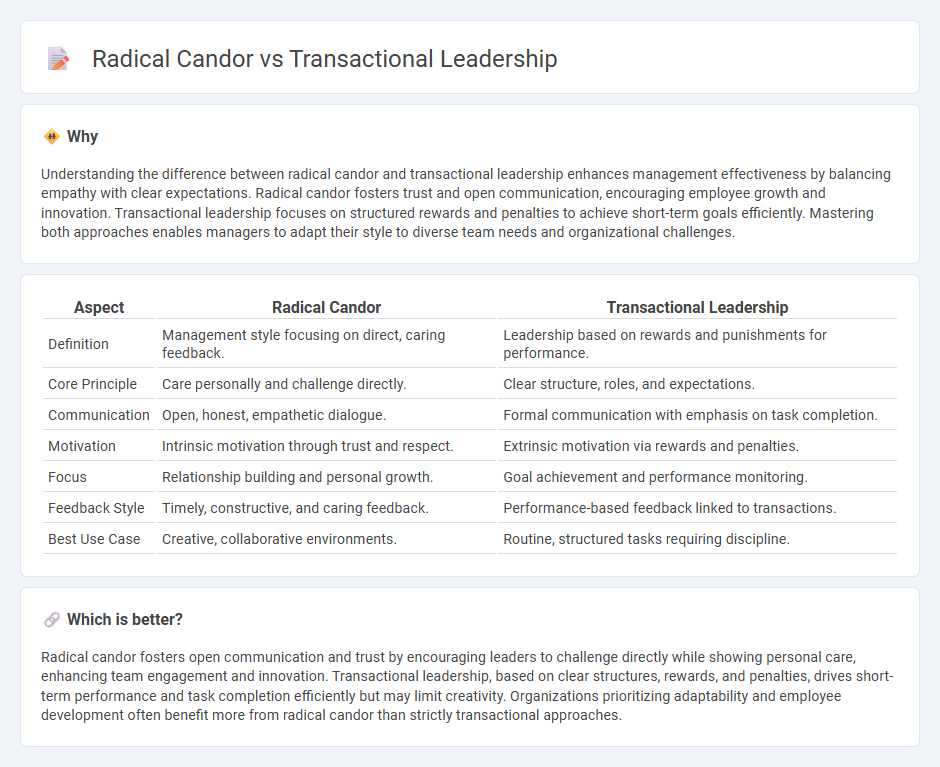
Radical candor emphasizes open, honest communication combined with genuine care for employees' growth, fostering trust and collaboration in management. Transactional leadership focuses on clear structures, rewards, and penalties to achieve specific performance outcomes and maintain order. Discover how these distinct leadership styles impact organizational dynamics and employee engagement.
Why it is important
Understanding the difference between radical candor and transactional leadership enhances management effectiveness by balancing empathy with clear expectations. Radical candor fosters trust and open communication, encouraging employee growth and innovation. Transactional leadership focuses on structured rewards and penalties to achieve short-term goals efficiently. Mastering both approaches enables managers to adapt their style to diverse team needs and organizational challenges.
Comparison Table
| Aspect | Radical Candor | Transactional Leadership |
|---|---|---|
| Definition | Management style focusing on direct, caring feedback. | Leadership based on rewards and punishments for performance. |
| Core Principle | Care personally and challenge directly. | Clear structure, roles, and expectations. |
| Communication | Open, honest, empathetic dialogue. | Formal communication with emphasis on task completion. |
| Motivation | Intrinsic motivation through trust and respect. | Extrinsic motivation via rewards and penalties. |
| Focus | Relationship building and personal growth. | Goal achievement and performance monitoring. |
| Feedback Style | Timely, constructive, and caring feedback. | Performance-based feedback linked to transactions. |
| Best Use Case | Creative, collaborative environments. | Routine, structured tasks requiring discipline. |
Which is better?
Radical candor fosters open communication and trust by encouraging leaders to challenge directly while showing personal care, enhancing team engagement and innovation. Transactional leadership, based on clear structures, rewards, and penalties, drives short-term performance and task completion efficiently but may limit creativity. Organizations prioritizing adaptability and employee development often benefit more from radical candor than strictly transactional approaches.
Connection
Radical candor enhances transactional leadership by fostering clear, direct communication and immediate feedback, which drives task-oriented performance and accountability. Transactional leadership relies on structured rewards and penalties, and radical candor strengthens this by encouraging honest dialogue that clarifies expectations and motivates employees. This connection improves leadership effectiveness by aligning goal-setting and corrective actions with transparent, respectful interactions.
Key Terms
Authority
Transactional leadership centers on clear authority by emphasizing structured tasks, rewards, and punishments to achieve compliance and performance. Radical candor, while valuing direct communication, balances authority with empathy, encouraging honest feedback within supportive relationships. Explore how both approaches shape effective leadership dynamics in diverse organizational cultures.
Empathy
Transactional leadership primarily emphasizes structured exchanges between leaders and followers, often focusing on performance and rewards, which may limit the role of empathy in leadership interactions. Radical candor integrates empathy by encouraging open, honest communication paired with genuine care for team members, fostering trust and stronger relationships. Explore how balancing transactional strategies with radical candor can enhance empathetic leadership and drive team success.
Communication
Transactional leadership emphasizes structured communication through clear expectations, rewards, and feedback to maintain performance and adherence to organizational goals. Radical candor prioritizes open, honest, and empathetic communication that challenges individuals directly while fostering trust and personal growth. Explore how these communication styles impact team dynamics and productivity.
Source and External Links
What is transactional leadership? - Definition from WhatIs. - Transactional leadership is a style where leaders use rewards and punishments to manage employees who are motivated by clear goals and close monitoring, best suited for structured environments with defined tasks and short-term goals.
Defining Transactional Leadership - Transactional leadership relies on structured management with strict guidelines, rewarding employees who meet goals and reprimanding those who do not, thriving in organized environments that value consistency and clear company policies.
Transactional leadership - Transactional leadership focuses on short-term objectives through a system of contingent rewards and management-by-exception, emphasizing exchanges between leaders and subordinates primarily through extrinsic motivation and performance management.
 dowidth.com
dowidth.com